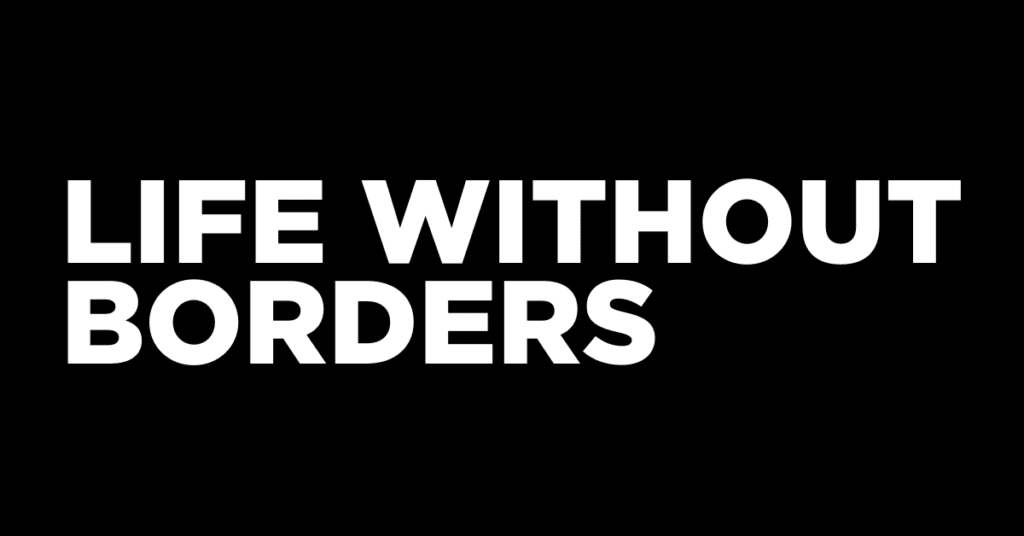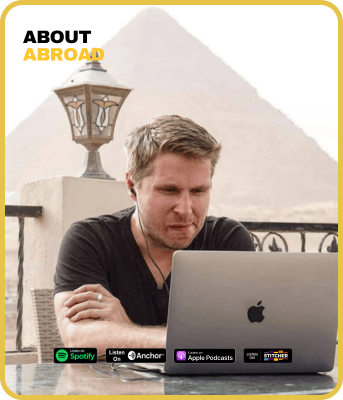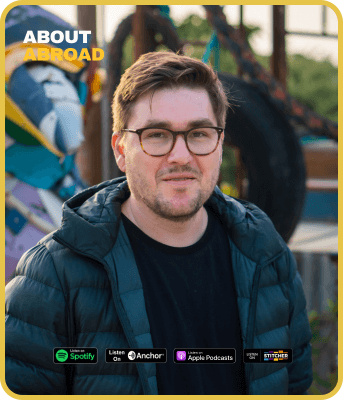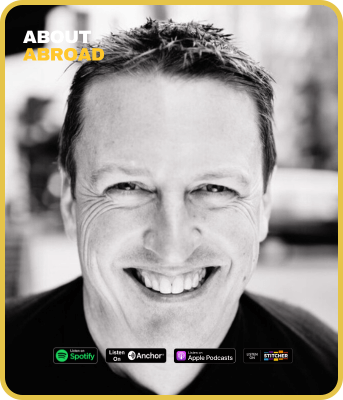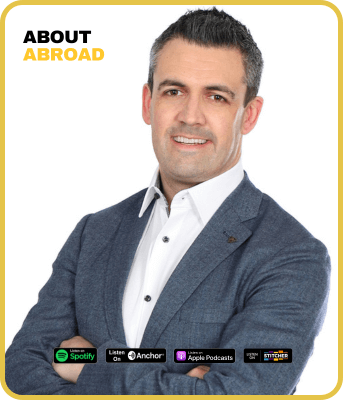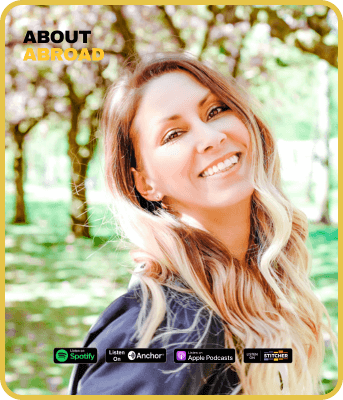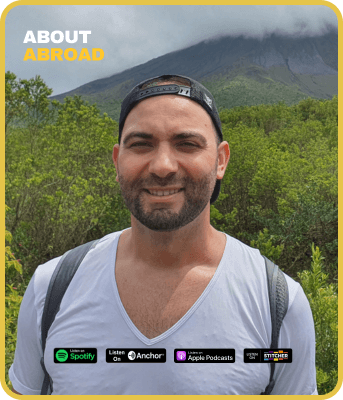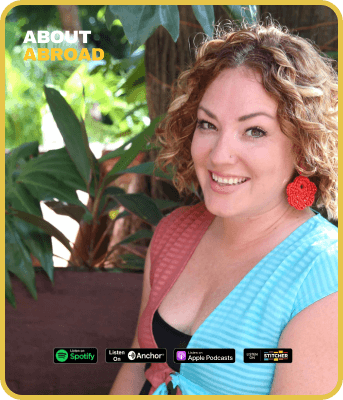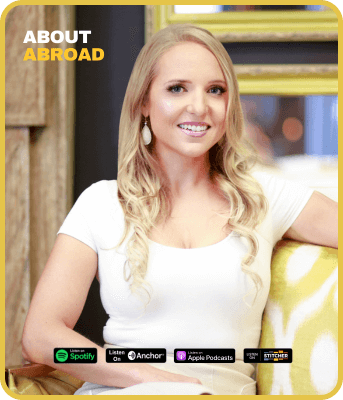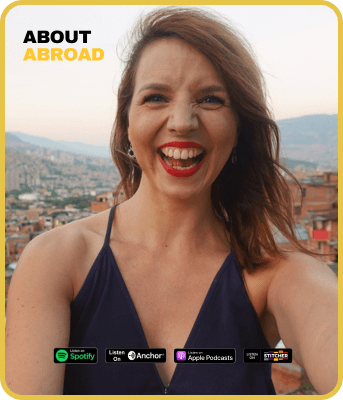Nomad to Norway, with Jason Moore from Zero to Travel
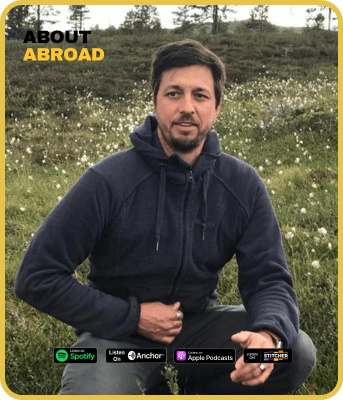
Nomad to Norway, with Jason Moore from Zero to Travel
Transcript will be available soon, stay tuned!
0:03
Chase Warrington
Hey, what’s going on everyone, welcome to another episode of about abroad where it’s my job to introduce you to people who have built amazing lives for themselves in various foreign corners of the globe. We’re talking with expats and thought leaders about moving abroad, remote work, visas, and all the fun and practical knowledge that you need to know to follow in their footsteps. If you’ve ever dreamed of making a life for yourself overseas, maybe working remotely or embracing long-term travel, retiring or studying abroad, or even just taking a peek inside life beyond your borders, you’ve landed in the right place.
This episode is brought to you by my friends over at the Fez agency. Did you all know that Portugal is currently ranked the number one country in the world for remote workers? Yeah, that’s right. Number one in the entire world with the beautiful weather mixed with the history-friendly people incredible coastline and awesome cuisine, it is really easy to understand why. And in fact, some of our most popular episodes here on abroad are about Portugal. So I already know that you all love it. And I’m not going to waste your time trying to convince you to go visit. But what I will try to convince you of is planning your next company retreat there. And when you do to use the fez agency, as an agency is local right there from Porto with people on the ground to help you plan your company retreat, they can map out every single detail of your off-site anywhere in the country of Portugal. So that way you can arrive you can unwind and recharge with your teammates. Without the stress. You all know you’d love it there. I know you’ll love it there. So let’s get your team there. And the next time you’re planning a company off-site, consider Portugal and then contact my friends over at the fez agency to make it happen. You can visit them via the link in the show notes. My guest today is one of the leading travel podcasters out there his name is Jason more of the zero to travel podcast and even more than a podcast. It’s a community a platform of business all dedicated to helping people open their eyes to the world of travel. So he’s been a huge inspiration for me it was an awesome experience bringing him on about abroad and chatting with him about building his podcast and the whole community around it and his exploits around the world sort of one of those old-school digital nomads that have been doing this before digital nomad even existed and just a blast talking with him. So I want to say a big thank you to Jason for coming on the show. I think you guys will enjoy this one a lot. Please help me in welcoming Jason to about abroad. Jason man is so good to have you on the about abroad podcast. I’ve been looking forward to this for a while. So first of all, welcome. How’s it going?
2:39
Jason Moore
Great, man, thanks for having me. It’s an honor to be here. And I love what you’re putting out with the podcast helping people get abroad. You know, we’re sharing the same mission in many ways. So it’s always good to connect with somebody that doing their part to get people traveling. So yeah, thanks, man.
2:54
Chase Warrington
Yeah, yeah. Well, I’ll start with just a little bit of background sort of for you and sort of for the audience. You know, when I started thinking about doing a podcast, I was already listening to some and wanted to hear some others. And yours was one of those that was in a similar space that was already doing that and had been listening for a while. And so you know, there’s just, there’s some incredible episodes in there, which will link to of course, the people listening to about abroad can find you if they haven’t already. But I just do kind of want to start with like a huge thanks for leading the way in that regard. Because I don’t think there was a lot of you before you started zero to travel, I would love to kind of start by asking you about the origins of the podcast and, maybe see where that goes. And lead us into your background and such. So yeah, tell me about the origins of the podcast, because I don’t know the story.
3:40
Jason Moore
Okay. Yeah. Thank you for the compliment. By the way. I appreciate that. Yeah. So it started with that pure intention of just hearing from a lot of different travelers around the world through conversations and hostels, and whatever, just from traveling around and understanding Wow, there are a lot of different ways that you can travel the world that I had no idea existed, right, like things that I What do you mean, you can like work on a farm in New Zealand and live there for a cup like I didn’t know, you know, some friend did that. And then I found out about that, or, you know, I meet the random guy that was just traveling around and painting boats and docks, and people teaching English abroad and all these different things, you know, volunteering on organic farms, and this stuff that at the time, you had to kind of gather up word of mouth when I was traveling, right? Because to date myself here, I’m going to date myself. But you know, I took my first solo backpacking trip after college in the late 90s. After spending a good year and a half touring, that’s another story around the US with my work, and the sort of career I fell into using that in air quotes. So yeah, I started, you know, traveling by getting a job that required me to travel around the US, and then I was traveling overseas and talking to all these people and just getting so inspired. And then even you know, utilizing some of those strategies myself and just learning more about travel and really out of the pure intention of wanting to sustain my travels and to just kind of keep things going, but the more information I took in I was just so blown away by the opportunity there was to travel for a lot of people that would I say, would write it off because of the marketing of the travel industry, right? Or just their experience of okay, well, you know, I spent a week in Mexico. So I paid $2,000 for the hotel and all this stuff. And so obviously, who could afford to travel for like, three or four months, or six months or a year more, whatever. So after many years of traveling, I would always get very excited when somebody would ask me how I did it, which would happen a lot daily when I was touring, like, how do you get a job like this driving a double-decker bus or on the, you know, whatever I was doing, why are you driving a giant cat bar on the US? How do you get a job like that? How do you trout, you know, so I’d answer all these questions, and it would light me up. Now, I would say 90% of those people would not take my advice. Right? Not because it was bad advice. But they would just like to go on with their lives and whatever. But I’m like, No, I get excited. It lights me up when I can help people travel. So with the podcasts and your travel in general, the intention was to just share all of these different ways almost like an ala carte menu where people could utilize these different tactics and strategies and advice and a lot of mindset stuff in their lives based on where they are right now. And that’s always going to change, right? So what does that mean, you’re building a life of travel and travel is one of those things, I feel like it’s not a hobby that just goes by the wayside as you get older, like maybe knitting or playing an instrument or something where you maybe get bored of it or whatever, I feel like travelers are kind of in it for the long haul, you might not be nomadic forever, you might not, you know, live abroad forever, whatever the case is, but if you love to travel, if you’re listening to this show, you’re probably somebody that’s gonna love travel in like 30 years, or 20 years or 10 years. And how you do it’s going to change. So I thought there was a lot of value in sharing a lot of these stories. And instead of keeping them within a conversation at the hostel, or whatever the case is, the audio seemed to be it was just a format I was attracted to, right? It’s like, oh, we can have a conversation, we can go deep on something we can get to know somebody who understands their mindset, get practical tips and advice and strategies. And then we could just share that conversation. And people might listen, and it turned out that they did, which was cool and shocking. But really, it was just the intention of wanting to share the stories and the different ways to travel. And I found a piece of paper on that I wrote my goals on for zero to travel, I was stuffed in a box that somebody sent to me because I had some friends of mine pack up my apartment in Colorado when I sold it and send this box out to Norway where I live. And I found it in one of these random notebooks and the goal, the intention was right, there was like inspire a million people to travel the world, which seemed like insanely big thinking, but that was kind of the intention, right? Like, try to think big, you know, shoot for the stars maybe hit the moon kind of thing. So yeah, that intention has carried the show for eight years, because it’s all about Alright, well, What else can we add to the conversation? What are some things happening right now in travel, like, you know, what you do with remote work, and all of that’s exploded over the last few years? I mean, we’ve been talking about location dependence and all this stuff for many years. But you know, it’s an ever-changing world. So we just keep trying to bring on people that can provide value to the audience and to give people some things to think about and to give them tools and just ideas and mindsets to build that life travel for the long term. So that’s the long answer.
8:23
Chase Warrington
I love it. We share so many similarities that in a way that like resonate with me there and one of them is I can envision you in those early days. Like your sort of your why, you know what, what got you interested in this idea of sharing these stories. And I’ve said before, one of the things that sort of called to me as I have always loved since I began traveling, just the random like go have a beer, go have a coffee with someone from another country, especially if you happen to be to foreigners. Like I’m from the US and I have a friend from the Netherlands and we’re both living in Spain. And so for us to go just sit down and chat about you know, what’s your life like in the Netherlands? Where are you from? You know, how do you come here? How are you able to stay nerdy like Visa stuff, how is this legally possible? And also just the like, fun, inspirational you know, what’s your life like there? How did you adapt to this or would I do that for free? I mean, it’s like literally what I do in my free time I can never get enough of those conversations, and like you I thought I think maybe somebody else would be interested in this you know, this stuff’s practically helpful for me, and a lot of fun for me maybe somebody else is interested and I’ve gotten a lot from that and you have a massive community around you that I think it would be cool to share some details on with the audience as well but I imagine you get a ton from that like that must build you up and feel so good to be having these conversations inspiring all these people and hearing their successes the way it’s transformed their lives. Is that fair to say?
9:46
Jason Moore
Absolutely. That is the currency that keeps the show going or the fuel for me I mean I couldn’t do something week in and week out for this many years with usually I last you know, less than a year when I was doing you know freelance contract work. It’d be like you know, less than a year Couple years at the same thing, and that was pretty much it moving on to the next thing. So yes, that’s absolutely the thing that keeps me going. And I’m with you, I think it’s a form of travel, right? Like when you get to sit down with somebody from another country or just have a conversation, whatever same country, you’re both abroad, talking about travel or just hearing about their life experience, to me is a form of traveling, you get to kind of almost briefly walk in this in somebody’s shoes for a little while, understand a little bit about, you know, how they think and their philosophies on life and different things. And it just gives you new perspectives. And I think staying open-minded is like an active kind of mode to be in, right? Or you can say, well, I’m open-minded, but it can, it can close off, right? If you’re not sort of actively trying to stay open-minded is how I feel. So for me, the podcast also in these conversations, just keeps things fresh, keeps me open minded always brings up new ideas and perspectives that I hadn’t thought about because I can only walk in my shoes, but with a conversation, you get to, you know, hear from somebody else’s experience and their background. And that’s a form of travel for me as well. So I love it.
11:07
Chase Warrington
Yeah, it is like a muscle you have to keep working a little bit like keeping that open-mindedness and we get settled in our ways. I don’t, I mean, actually be a nice segue, because I’d love to hear about your transition from being this Nomad that you know, was taking on odd jobs and exploring the world in different ways, that way too, you know, having the life that you have now in Norway and all that, but I, it reminds me of the fact that like, we do get settled in our ways a little bit. And I always draw this comparison, like, you know, when you go on when you go abroad, or you just go on a trip somewhere for the first time, when you’re in those first few days or weeks of being in a new place, you’re always very open, I always find myself I’m like I have, you know, you meet lots of people, you exchange numbers, you, you just people kind of come up to you and can tell you’re a tourist, and they’ll give you advice. And there’s a lot of like openness there. And as you know, I’ve been here in Valencia, like I for four years, my your world kind of closes off, you do become a little bit more closed and settled in your ways. And it becomes your daily life. Yeah, it becomes your daily life. And so when it’s it’s a really good point about like, you know, keeping, you’re keeping yourself open-minded, and these conversations do help exercise that muscle. So I would love to use that actually as like a way to transition to I have no idea how you made that change from being this Nomad, and visiting all these different places to having the life that you have now, which I gather, you’re a bit more, you know, settled there in Norway. So can you walk us through that and kind of take us to where you are today?
12:33
Jason Moore
I have no idea how it happened. either. You’re gonna have to talk.
12:35
Chase Warrington
I’m glad I’m not alone.
12:36
Jason Moore
No kidding. Well, I know how it happened. But of course, it all happens in real-time. So you know, Life is funny like that. I think transitions are a big topic in my show. And something that I’m fascinated with personally, after doing, you know, 500 plus interviews on the show, and just all the conversations over many years of traveling, it seems to me that most people are in a transition in some way, shape, or form almost all the time in your life, right? Like you might be transitioning to a different lifestyle, like when you quit your job and selling your house, and went to Ecuador, if you want to hear that whole backstory, you can listen to my show, it’s we had you on there, but you know, that is a very clear sort of, hey, it was my life was this. And then this transition time was me, you know, selling my house, quitting my job, whatever. And now my life is this, you can almost paint that picture. But I feel like there’s a subtle transition going on maybe more subtle transitions going on almost all the time. And I think that’s a good thing to be aware of. Because you don’t necessarily want to camp out in the transition phase, right? I feel like when you camp out there for too long, that’s when things get a little stressful, at least for me, you know. And you know, that happened at the end of my Nomad days. And we talked a little bit about this before I spent a decade a little over a decade as a nomad, not having a home base and working in the event marketing industry managing touring events around the USA, I managed a tour manager band for a while. So we did the whole like sleeping on a tour bus playing different shows. You know that my whole life, I worked as an adventure travel tour guide for the summer. So, you know, I got to live a lot of these different types of life lives on the road, which I love. I love hearing about other people’s lives and living vicariously and then I love living different lives myself. You know, I wish I could have like multiple lives going on at once so I could be experiencing them all at once. I don’t know how that works. Elon Musk, if you’re listening, let me know. How’s that neural link thing? Guy? Maybe there’s a way to do that. Shout out to Elon. So I don’t know, man. Yeah. For me, it kind of evolved in real-time like most people, and I just started working this touring job. The first one was a charity event where kids would race modified lawn tractors around a big box retail parking lot. And we would set up the race course and run the whole event usually with volunteers, which was sometimes a nightmare. And you know, I got the tour schedule for this and I got offered this gig and I’m like, What is this? Like? I don’t even get the faxed me the tour schedule. Okay, I was like I don’t even Know what this is, but I just see this, I get to go to a different city every week. And like, just say I’m making 500 bucks a week like, Oh man, I’m gonna be rich, like, you know, I can pay off some of my student loans. This is more money than I’ve ever made in my life. I’m gonna get $30 a day per diem, and I’m gonna live on the road for whatever was eight, nine months. And you know, I went and I did it. And it was a wonderful experience. And I got thrown into this whole industry where I worked as a touring event manager. So I managed a bunch of different events and left some of the other stuff that I just mentioned. But while that was happening, really how I ended up being a nomad was not most people end up being nomadic today, which is they see the digital nomad thing and maybe get a remote job. And it’s like a very intentional decision. I was like an accidental nomad. I just kept taking gigs and traveling because I’m like, Well, why would I stop doing it? I’m having fun. I’m making money. I’m traveling and getting paid to travel. And then in between these contract gigs, I’m taking the money I saved and traveling around the world and having an absolute blast. So why would I stop I just decided to not stop. And that just turned into 10 years. Now, in the end, I was getting kind of burnt out. And maybe that’s the transition you were kind of alluding to is all right. Well, at some point, I was like, it was funny because my first stint somewhere in one place as like a renter, you know after college was many years after being on the road and my girlfriend at the time and I rented my buddy and his girlfriend place for six weeks in Boulder, Colorado, because I always loved Colorado and loved Boulder, and they were taking their first backpacking trip to Central America. So it was like and I’d been on the road for all these years. And they were just kind of getting their nomad day started, which was funny. So we kind of flipped the script there. And that was cool. And then I ended up just moving to a place you know, after all the traveling I’m like, I love Colorado so I’m just gonna move Colorado because I love it and there was no job or anything. And then you know, move there and figured it out at a steady gig for a while selling booze for a liquor distributor. That was like my one sort of normal job. And then I just wanted to have the freedom to travel more and be wherever so I got into heard the term location independent. I was like, that’s the that’s my jam. I want that. So started working towards that. And eventually figured that out and met my wife in Brazil, which is another story started dating her she’s Norwegian, and we met in a hostel. So one of that hostel loves gone too far. Now I live in blah, blah. Now I live in Norway. I’ve got two small kids. And here I am. And now I’m a citizen. Actually,
17:24
Chase Warrington
Did you get your citizenship?
17:25
Jason Moore
Yeah Just a couple of months ago.
17:27
Chase Warrington
Oh, how many years did it take roughly?
17:30
Jason Moore
Came here at the end of 2015. So was 26. Citizenship?
17:34
Chase Warrington
Was there, a hefty process to go through for that? Like, like, was it a brutal process? Or like, yeah, you just do go through take you to know, checkboxes, A, B, and C, and you’re doing
17:42
Jason Moore
well, but those are big boxes to check, like 500 hours of language lessons, and attaining a certain level of proficiency, you know, via the standardized tests, there was the time in the country of course factor, but my time counted for double because I was married to a Norwegian so that I was able to do a little shortcut there, I had to take 50 hours of social, like cultural studies for Norway. So it was, you know, the process of just the time in the language. And that, you know, mix all those and adventure. And, at the time, they did not allow dual citizenship, they only allowed that this last year. So I just operated under the assumption that it would be allowed again, so I was like, Well, let me just keep taking steps to permanent residency and assume that if I do all the steps it takes to get become a permanent resident then probably going to be close to being a citizen, or at least filling fulfilling all those requirements. And I was the only thing I had to do was pass a citizenship test in Norwegian. Yeah, after all the other stuff too. But I had already done that because I became a permanent resident.
18:46
Chase Warrington
It’s just Norwegians, just one of those languages that we all pretty much just pick up by osmosis though. I mean, it’s out there, you know, you just see it, it’s easy, no, obviously being facetious.
18:57
Jason Moore
No, well I’m not my specialty isn’t a language that’s for sure. Just ask my wife but it is one of those languages where it’s, it’s like Spanish in that once you get a grasp on some certain words and structures, you can almost guess the word because it’s close enough to English, you know what I mean? you can do that with Spanish and you can almost be right with a lot of certain words if you know what I mean. So that’s what’s cool. It’s not like learning Vietnamese or something where it’s totally like tonality say, or it’s completely different. So in that way, wasn’t the hardest lesson learned. But I use that with a big caveat because I’m still not a great Norwegian speaker and I’m just in comparison to you know, some other foreign language where they know, maybe right to left and it’s completely different.
19:41
Chase Warrington
Oh, yeah. I studied a little bit of Mandarin for a while and like I mean, I’ve time I like I didn’t speak any other languages very well at that time. And I just thought like, oh, yeah, I can kind of speak Mandarin but like, in retrospect, I totally couldn’t. I could like say some food words and you know, give directions maybe but it was so hard. Like, that was just like you have to dedicate yourself to that. And I think more or less the languages that you’re going to learn in, in, in Europe, for instance, are in Latin America in Spanish like these, you see enough similarities. There we go, okay, I can I can grasp this with once you get the basics down, it starts flowing fairly easily.
20:16
Jason Moore
Your Spanish must be pretty good now
20:18
Chase Warrington
You know, my response might be similar to yours. Like, I don’t think I’m very good. You know, if I talk to a native person, you know, they, they’re gonna know I’m a foreigner, and I make lots of mistakes, or I can’t find words that I want to use. But I yeah, I feel comfortable, you know, in situations where English can’t be spoken. And I have Spanish friends, for instance, that don’t speak English. So I’m comfortable but far from perfect. You know, it’s funny, I don’t know if you get this question people off. Like, when I go back to the US, I always get asked, Oh, are you fluent? Like, it’s like, people jump from zero to fluent. And I’m like, I don’t know how you define fluent. But I would say no, like, not, I definitely can’t say fluently.
19:42
Jason Moore
Yeah. If I had to think of a definition of fluent to me, it’s like, I could pick up any book, read it, and then discuss it intellectually with somebody else. And I can’t do that.
21:04
Chase Warrington
Yeah, I mean, either. No, far from it. So how long have you been there now in Norway? Because, well, let me back up one step Norway on your radar? Was it a place you had the desire to go to? Or was it like I met
21:17
Jason Moore
This was after I met this girl?
21:18
Chase Warrington
Yeah, exactly. That’s okay. That’s the answer.
21:21
Jason Moore
Yeah, I mean, well, of course, I think like any long-term traveler, Nomad, or anybody of that ilk, you kind of want to see every place and experience as many places as possible. So it wasn’t I think Scandinavia is one of those areas where most people avoid it at least earlier in their travels because of the expense. Yeah, right. And it’s just not a backpackers Haven, you would think but, with wild camping and a certain mode of travel, it doesn’t have to be expensive. It’s like anything, right? Depends on how you tackle it. But it’s a place I always wanted to go because I wanted to go everywhere. Yeah.
21:56
Chase Warrington
We’ll be right back to the show. After a quick break. For a note from our sponsor. This season is brought to you by my good friends over at insured nomads. They’re the absolute best in the business when it comes to providing health travel and medical insurance for nomads, expats, and just all forms of world travelers. I know insurance is often something that’s overlooked when we’re fantasizing about traveling the world. But it’s an absolute necessity that we address this because often the policy you have in your home country isn’t going to cover you while you’re abroad. And it’s also a requirement as a lot of people may not realize to buy private travel or expat insurance, as it’s called sometimes to obtain a visa or even enter certain countries. So, fortunately, there are companies like insured nomads to help us with this. Not only do they have excellent coverage and great prices, but they’re also providing a first-class experience with additional perks and best-in-class technology via their app. It’s an amazing experience, I can’t recommend it enough. Now, this is a company that was built by world travelers for world travelers, so they know what it’s like to find yourself in a difficult medical situation abroad. And they want to keep you from having that same bad experience. So the next time you’re planning a trip abroad, whether it’s for a week or a lifetime, check out insured nomads via the link in the show notes. Hey, guys, if you’re still around and enjoy this episode, then I think you might like our once-a-month newsletter as well. If you’d like to sign up, just open up the show notes of the episode you’re currently listening to scroll down, and look for about abroad.com/newsletter It takes about 30 seconds to sign up. It’s a fantastic way to support the show. And I think you’ll be pleased with the information that we provide every month as well. Thanks a lot for listening. Hope you enjoy the rest of the episode. To be honest, that’s what Norway is. For me. It’s on my list. I have not been there. I see these amazing pictures of fjords and beautiful villages and just the amazing nature. You know, people talk about the Northern Lights and there’s just there’s a lot that can be experienced there. But it has escaped me that the expense is one of those factors for sure.
23:56
Jason Moore
You don’t want to pay $15 for a beer.
23:58
Chase Warrington
I mean, you know, I’d love to say that that’s just an everyday thing for me. But I’ve gotten used to $2 Here in Spain, and it’s quite a jump. So yeah, I don’t know, I don’t know why that is because it has so much to offer. We’ve never covered Norway abroad and certainly not from the aspect of somebody that spent as much time there as you have. I’m gonna go super broad here and just ask you to tell us a little bit about Norway in terms of maybe we’ll look at this from the lens of somebody that would be coming to Norway for the first time. What might you recommend? They do? And then let’s transition into you know, okay, now this is going to be more of a long-term thing. We’ll book start focusing on that.
24:38
Jason Moore
Yeah, for a visitor. I mean, I think it’s the general rule that applies to most countries, right? You want to try to emulate the locals in any way in many ways, right? So a big part of the local culture here is pretty loose tea, which is like free time outside. They value nature. They value being outside in all conditions because you have to do that when you’re Norwegian. If you don’t get outside in all conditions, then you’re probably not getting very much. And that was an interesting part of the call one of the many interesting parts of the culture for me, and, frankly, one of the parts of the culture that I value as an individual, and also as a parent of two small kids, I love that my kids go outside at their daycare, whatever, every day, they just put on more clothes. There’s a famous Norwegian saying it says do finish aka DOORLY, bada DOORLY car, it just means there’s no such thing as bad weather only bad clothing. So you see people like there can be snow on the ground, it’s cold and some guy will go or gal will go pedaling by on a bike, you know, with just crazy fat tires on the snow or with a kid on the back. And you know, the kids sleep outside and their strollers here. When they’re babies. They just take them outside. That’s where they sleep or within sight. Usually, it’s normal. You might walk by a house and see a stroller outside. And though a baby is sleeping in there, it’s the middle of winter. It’s just what they do. And you know, that is cool to me. Because getting outside is an important part of being human, I think and having that connection. So as a visitor, you can do that. Right? I mean, you’ll see, you think about we talked about the expense. Well, one popular thing to do in the summer here. I don’t agree with this environmentally. But there’s something called an EN gongs grill, which is like a one-time-use grill that you can buy at the store. So the proper thing people do is they’ll buy one of these things and take it to a park and they’ll buy hot dogs. And they’ll just light it and grill hot dogs and have some beers with their friends and just hang out, you know, that doesn’t cost very much. And you’ll be surrounded by locals and probably meet a lot of them. There’s a lot of stuff like that, that doesn’t cost money being out in nature. And I think when you’re looking at Norway, if you want to spend time here you have to plan on being around nature and out in nature, no matter what the weather. So you have Oslo which is I think a growing city in many ways. Since I’ve gotten here. It’s changed a lot. And I think in a lot of great ways. It’s improved over the years, a lot of diversity in the city, like most cities, and plenty of activities to do in the city. So I think you want to plan on spending some time in Oslo, then you probably want to get out to the West Coast and do the bargaining thing. It’s always ranked as one of the best train rides in the world the train ride from Oslo to Bergen. So that is something you want to pick in advance and book a ticket in advance. It is beautiful training, right? I’ve done it but then once you’re on the West Coast, you could spend some time in Bergen and then you can explore the west coast and that’s where when you see the dramatic fjords and like sort of The Lord of the Rings type of scenery, that’s where a lot of that is like the cliffs and the fjords and things like that on the West Coast. Now the caveat is the weather there’s a lot crazier. So you know, my biggest tip is if you have certain activities planned, really take it day by day based on the weather, right? If you think like you’re going to be oh, we’re going to stop here, and then we’re going to do this hike, and then we’re going to do this next day we’re well okay, yeah, you could do that hike, but just know that it could be raining like crazy, especially on the West Coast and crazy windy, right? So don’t have a fixed itinerary in that way. You know, be open to kind of shuffling things around a bit based on the weather. Because if you see oh, it’s gonna be sunny this day, and we’re gonna be near this fjord. Do it that day
24:38
Chase Warrington
Yeah, take advantage of the sun.
27:49
Jason Moore
Right, like you have to get out and do it in the weather is a huge factor here. I can’t under I can’t overstate that. So and then there are a lot of just, you know, small hidden gems, and one of the first things I did when I moved to Norway was move. When I first came to visit, my wife, I should say on our sixth date was us living together. That’s another story or for your month, we took a 10-day road trip around Norway. And that was a great way to get to know the country and we just stopped along the way and rented camping cabins and things like that some of the cabins were on people’s farms, they would have these cabins that they would rent out others were like at campgrounds and there’s a big cabin culture here so we were able to kind of do that sort of spontaneous Hey, where are we going to go what are we going to do and we ended up with some cool places having some great experiences and I think a good old fashioned road trips always a great way to see a country you know you can’t do it all no way is Norway’s very long so I think someone was telling me if you like swung it around, I think the south if you know took the north and just swung it down. I think it would have reached Sicily or something.
29:20
Chase Warrington
Wow.No way. Yeah. Across Europe. Yeah, yeah.
29:23
Jason Moore
So you know, airlines, if you want to go up north and things like that, it’s probably the easier way to go. Unless you want to drive many many.
29:31
Chase Warrington
There is an I’m a campervan guy and so you get in these campervan, circles and WhatsApp groups, and things like that. Oh cool. Have one or Yeah, yeah, we have a camper van here and so we travel around in it quite a bit. And there’s a rumor out there that the like sort of like the Holy Grail of European campervan thing is to drive from Tarifa in the south of Spain, which just like awesome, beautiful beaches and it’s like a windsurfing capital kinda place little hippie town down on the Mediterranean you drive from there up to the north of Norway and this is supposed to be like the most epic trip and people do it and you know people take years people take months but I think it’s
30:14
Jason Moore
awesome yeah, man stop by Oslo
30:16
Chase Warrington
I’m gonna have to what kind of Van Do you have it’s a Ford Transit one of those white box vans that have been converted and it’s not the biggest it’s the second it’s like a mid-range size so it’s tall enough where you can stand up inside and it’s long enough to where you know you have a bed you have a little shower kitchen table that kind of thing will kitchen or pull in air quotes but not the super long ones like there’s a bigger version which would be nice inside but a huge pain to park and in any kind of city so Yeah.
30:46
Jason Moore
We need to talk about this on my show this is a whole other thing I want because I’ve always had the dream of living the van life yeah, I tried to do it once actually bought a van I thought I did this was before there was hashtag van life because there was no Twitter I know I’m old I said it already so I was like people thought it was weird that I aspired to live in a van but I bought the van and then the guy that found it for me basically like took the money I sent and paid his bills with it nice great start Yeah, so I never got the van and then he did eventually pay me back over like a year so that was just me being foolish and trusting somebody
31:21
Chase Warrington
If it makes you feel any better the first dipping of my toe into the van life world I bought an old VW like super cool for Instagram if anybody had Instagram at that time Westphalia Yeah, and like old school classic so I bought an old cheap one and was just like redid it inside basically and stuff and it was just a total I mean it was a junker like it looks beautiful. It was the total money pit and ended up we driving it around for a couple of we did some short little trips and stuff just I mean it could barely climb a hill it had we ended up finding out later that it had like basically had a moped and shit like that it was not meant to pull a full camper van around and anyway blew up the engine on we’re setting off on a multi-month trip blew up the engine on day one didn’t make it 20 minutes down the road and from there on out ended up over like a couple of months ended up on 14 Different tow trucks and sleeping in we slept in more mechanic shops literally in the van in a mechanic shop than we did in parks
32:25
Jason Moore
What was wrong with it? Did you ever figure it out?
Everything the engine blew up then they couldn’t fix the engine then it led to carburetor issues clutch went out it was a total Comedy of Errors horrible at the moment I thought at one point we broke down in France and we had a like French mechanic who didn’t speak English in this tiny little town say you should kick shit in the river and he said just call it he was trying to say like call your insurance company pushes it down a hill and give whatever you can afford because this thing’s a total did you do it? No, I did call my insurance companies that how much will I get if I just like dropped this thing at a junkyard and they were like 500 euros I was like that won’t cut it what did you do so we ended up just investing investing investing fixed everything spent our entire savings at the time and then sold it and we’re just like you know to get rid of it we were honest with the buyers like here’s all the problems here’s everything we fixed Good luck to you. We were in Ireland and they weren’t going to try it out they were just going to drive it around Ireland and didn’t need to go very far it had new everything and we kept in touch for a while they never had a single problem with it as far as I know. But the van life is cool if you don’t want to do it long term in my opinion especially as a couple it’s hard to like tight space RV would be different arguments in that van yes yes it can it’s there are not a lot of doors to slim either. But I agree with you that I mean it’s a great way to see a country it’s great you know traveling like you and I are both from us and maybe we’re you’re used to air travel and you know driving across the country is like that’s a lifelong endeavor. You know, maybe you do it once or twice or something but and Europe something I love is that you can cross these borders you can go see different places cultures change. I don’t know if this is the case in Norway, but like from different parts of the one you could drive maybe an hour or two and hear a different accent here. People do things a little bit differently and I love that about driving and train travel in Europe in particular.
Yeah, me too. There are a lot of dialects here they’re like a couple 1000 or something people are gonna fact check means like, I don’t know exactly how many dialects there are but I know there is something it’s a lot ya know, the road tripping thing when I was doing the Nomad thing in the states that’s how I traveled was driving these crazy vehicles all over the state so it was really like a decade long plus road trip and so I love road tripping and I love that mode of travel and I love that you can slowly get to a place and see the landscape change and yeah you just get there you kind of earned it in a way Yeah, yeah very enjoyable way to see a place
34:52
Chase Warrington
it is and you stumble across the road less pat the border they say The Road Less Traveled or the off the beaten path. I’m combining the two at the same time but you stumble across things that you wouldn’t have stumbled across before. I know when I was on your show you were saying you ended up in Boone, North Carolina where I went to college. Like, that’s not something that, you know, most people, even from neighboring states might have seen before. But it’s, this is what I love about slow travel, it gives you that ability. It’s not just checking off cities and seeing the major sites. It’s all the stuff in between that really kind of makes the sweetness of it, I think.
35:25
Jason Moore
Absolutely. Yeah. And it’s so weird because when I got to Europe, road tripping, when I did the quintessential solo backpacking trip, my first trip, which changed my life forever, and responsible for everything that I’ve been doing today, I think even to this day, um, solo travel, highly recommended. Shout out for solo travel. Yeah, hashtag solo travel. I never thought of road-tripping, because I just had it in my head. Well, okay, yeah, I’ve got this euro rail pass, and I’m just going to do the train thing, hospitals and all that until I got to Spain, and I got to San Sebastian, and there was a crazy festival going on, you probably know which one it was. It was like the biggest festival of the year, I had no idea was happening. And there was nowhere to stay. That was cheap. I think there was one hotel room that was like 100 bucks or 200 hotel room. That’s That’s insanity. So I met up with some I just met these guys from Portland on the beach or something. And they had met them Canadian. I don’t might well, there was like a small group of us two guys from Portland and this Canadian girl we all met. And we just decided we instead of they couldn’t find a place to stay there. And nobody knew what they were going to do. And I was thinking, well, maybe I’ll just hang out here and then go to another town or something that night, but we just decided to stay up all night. Because why do we need to place to stay because it’s Spain? Don’t they stay up to like four in the morning?
36:37
Chase Warrington
Sleep is a byproduct of life. It’s not a focal point.
36:41
Jason Moore
Yeah. So we’re just like, well, that seemed like yeah, that kind of solved all the problems, right? We’re having fun together, we can just stay up all night and you know, party and have a good time and eat good food and hang out. And we did all that during the festival. It was great, fell asleep in the park at the train station, like right outside, and then woke up and all decided to take a road trip together. So we just spontaneously rented a car and then took a four-day road trip. And that was my first road trip around Europe. And as is so cool. Now we’re in a car and we’re seeing this is, you know, stayed in some places where the train doesn’t even go through. I think that was a cool experience.
37:16
Chase Warrington
Yeah, I love it. And what’s cool about that, like you were in so you were in den Sebastian in the north of Spain, which is in Basque country where they speak Basque, like it doesn’t sound anything like Spanish doesn’t look anything like Spanish. From there, you could have crossed back into the regular paint where like, you know, 10 minutes in any direction, you could be in another province where they’re speaking a bit differently, or a mix of Basque and Spanish. Or you could cross over into France and 30 minutes and be in here French. And like that, that is such a unique thing. And I gather like from listening to your show and just talking to you a little bit that we both have this just like lust for that that experience just calls to us.
37:55
Jason Moore
Yeah. And you know what’s crazy? That was the last time I was in Spain. Really? I haven’t been back to Spain. It drives me crazy. I’ve been back washed have been the Portugal that’s the closest I’ve gotten a couple of times, like fairly recently, but I need to get back.
38:08
Chase Warrington
Yeah. Well, you owe me a trip to Spain. I owe you a trip to Oslo. I really, do want to get up there. I wonder if we could you could share my urine inside. How long have you been there? Now? Did you say?
38:20
Jason Moore
Well, I officially came in 20 at the end of 2015. but I had spent a couple of years leading up to that at least two or three years dating my wife and going back and forth and doing the three-month visa thing.
38:31
Chase Warrington
So yeah, you’re very much the most knowledgeable person in Norway that I have met that has come from Norway originally. So I would just love to know from you. Like where we mentioned, Oslo. I think everybody knows, you know, as was there. You mentioned Bergen, which is where my mind goes, like I have the desire to visit Oregon, which maybe other people that are listening here if they’re sort of what the what’s the next place on that list that you might recommend, either as a place to visit or perhaps is like yeah, you should consider you’re going to come to be an expat here. You’re looking to resettle in Norway, you know, give this place a look at that third tier.
39:05
Jason Moore
Oh, yeah. I mean, it’s hard because I haven’t been to all these places, right? But on time is a place that is a student town that I’ve heard really good things about. So you know, there are ways to study abroad or have that type of cultural exchange and that would be a town to look at if you want to do something around education and be based somewhere in the north of Norway, believe it or not, this is always the case, right? Like you you get somewhere and then you see less of the place you see more of the world and less of the place you’ve been which is like crazy. I think part of that was a circumstance in my life. But the north of Norway, particularly like Lofoten is, you know, you’ve probably seen the iconic pictures of the mountains dramatically rising out of the sea. And you know, there are opportunities to see the Northern Lights in winter and experienced the midnight sun in the summer. It’s just such a cool area. So there’s like Svalbard and Tromso and places up there where you can have a unique experience. I have not yet gotten to have what’s interesting in the north of Norway, there are some pretty heavy-duty tax breaks for settling up there. So I just met the father of one of my children’s friends recently, and we’re doing a playdate thing. And he was telling me that his sister lives up there. And she’s up there for like a year 18 My picture was up there for a year. And that was one of the big reasons because you don’t pay either pay, don’t pay any taxes, or you pay very minimal taxes because they need to get people up there to like, teach the kids in the school or whatever. And I’ve also heard that there’s a lot of good vibes up in north Northern Norway, in terms of, you know, Norway is not known for like strangers, feeling friendly. It’s not like known as a friendly feeling place, part of that I’ve discovered over time is that their version of politeness is different than ours as Americans. So their version of plight is kind of like not bothering anybody on the street. And that can come off as cold and tough when you come from particularly the US at least where, you know, you could be buying a Snickers bar at the gas station. And next thing, you know, you’re exchanging life stories with the cashier, because everybody just talks to each other in America. And it’s like, nobody talks to each other here on the street, because they don’t want to bother each other. But I think that they like they don’t like that either. You know, it’s just the way it is. But as an outsider, you get to break that rule. And people don’t like, look at you like, You’re weird, because they’re like, Okay, well, therefore, they don’t get it. And then they’re happy to engage in the conversation. So yeah, but I guess up in the north, it’s pretty, it’s a little more open and friendly in that way.
41:35
Chase Warrington
What I’ve heard interesting, normally, as you go more, it’s funny. Like, there’s this general tendency I feel like people have it’s certainly true here in Spain, it was true. And I spent time in Ecuador. It’s true in the US that there’s this perception that like southerners are and I think that’s true in Italy, too. I’ve heard an Italian tell me this. Southerners are more friendly and in the North, it’s colder, you know, people are a little bit more closed off. It’s kind of interesting to hear that. Oh, yeah. It reminds me of the Wild Wild West, like, like, well will pay you to go live up there. Just go. We need humans there.
42:05
Jason Moore
Yeah, I mean, I think when it comes to visiting a country, of course, it depends on what you’re doing, and how long you’re staying and stuff. But there are a couple of things to consider. I mean, the first is like, what kind of lifestyle do you want to have on the day-to-day, if you’re going to spend six months in a place or whatever? Determine the amount of time. And how much does it matter that you’re around that particular lifestyle? Or those things? Right? So if you’re like, hey, well, I want to be around the city life, you know, I value that. And that’s like, sort of the daily life I kind of envision having in terms of this experience abroad, then, you know, helps to narrow down the list, right, or if you’d like, you know, I want to live in a smaller town where there’s like hiking nearby, and is that maybe a ski resort within an hour or whatever, like, kind of come up with your list of lifestyle, desires or wishes, and then just try to find a place that ticks as many of those boxes as, as you can, right? And then the balance that I do feel like, I think this comes over time for my travels now, it’s almost less about the destination, and more just the overall experience, you know, it’s not that I don’t care about the destination, it’s just that I kind of don’t care about the destination. It’s much less important than it once was, for sure. It’s just an experience, and I’m just gonna kind of go to a place and take the experience in
43:15
Chase Warrington
Yeah, I couldn’t agree with you more. The destination itself has luster has faded for that, but by an inclination towards just a great experience, and enjoying myself. Comfort, happiness, like what I need at that moment is much more important. And I think I don’t know if this occurred to you. The downside of that is that I have this like, growing bucket list of places that I do want to see. But I find myself saying, at the moment, that’s not what I am, you know, I do want to check it off, so to speak. But I, but it’s not what, it’s not the experience I’m looking for right now.
43:49
Jason Moore
Yeah. I mean, you know, what on my list is a lot of those are just experiences. Yeah. And it is what it comes down to right? It is less destination driven, even that list. But yeah, I think that’s an important thing to kind of think about when you’re planning your travel, I think that comes over time, too, right? If you’ve kind of gone and I want to see this, I want to see that. And you go and see those places, and you’re fortunate enough to have a lot of years of traveling and experience in that way maybe becomes less important because you’ve kind of been there done that in some ways. You know, I don’t feel like I’m missing out. Okay. There are certain things I do want to see. Yes. But I’m not like, you know, almost like desperation before, like, if I don’t see this, like my life is not complete, you know? And now it’s just like, well, I’ll get to it or if I don’t get to it before I die, then I guess I won’t get to and I
44:35
Chase Warrington
Yeah, life will go out there. The world is very big. I think we have this like vision or we have this mentality now that because we’re so easily connected and we can just you can sort of like travel through somebody’s social media accounts now. And you can consume content and communicate with people on the other side of the world. It feels like the world’s small and very, very easily accessible, but there’s just so much out there. I mean, there’s so people will say like, oh, wow, you’ve traveled a lot now Like habit like there’s so there’s, there’s so much that I haven’t seen that it’s just this like little fraction of the pie that I have seen. And I don’t know there’s, there’s something like really cool about that, I think to remember that it’s just this big wide-open world out there.
45:12
Jason Moore
Yeah, it’s kind of you know that adage when it comes to knowledge, right? Like, it’s like, the more you know, the less you know, kind of things. Same with travel,
45:19
Chase Warrington
the more items you check off the bucket list, the more destinations the more experiences, and the more that list will just
45:25
Jason Moore
The see, the more you realize there’s you haven’t seen much.
45:28
Chase Warrington
Yeah, it’s so true, Jason, man, I would just love to sit here and pick your brain for hours. I feel like there’s a lot left on the table here that I would love to ask you about. I know that we’re a little bit limited on time. So I’m gonna let you run and maybe follow up with you another time to pick your brain more. Where can people follow along, learn more, follow your story, and check out the podcast? Well, of course, include all this the in the show notes so people can access it quickly. But while we’ve got you here, I’d love to share that with the audience.
45:56
Jason Moore
Yeah, thank you very much for having me. And I had a blast betting travel with you. They are always so much fun. And yeah, I mean, if you’re listening to a podcast right now, you probably have a podcast app or whatever. So if you just search zero to travel all spelled out, no numbers, then you can find the podcast. And if you find the podcast, you’ll pretty much find it easier to travel.com is also a place
46:15
Chase Warrington
Nice and I’ll take the humble hat off for Jason so he doesn’t have to there’s a ton of awesome content their communities access to tons of content promotions going on. He does a lot. So really do check that out. If you’re interested in building a life for yourself abroad or embracing long-term travel, I think I think you’ll be disappointed Jason man. Thank you again. I look forward to your trip to Spain and my trip to Oslo and catching up in real life. Hopefully before too long.
46:40
Jason Moore
That sounds great, man. Thanks for having me. And thank you for listening. Thanks, guys.
46:48
Chase Warrington
Thanks for tuning in today from wherever you are in the world. Once again, I’m Chase and this has been another episode of about abroad. For those of you wondering how you can best support the show, I have made it super simple for you. Just go over to the show notes of the episode that you’ve just finished listening to and click on one of the two following links about abroad.com/newsletter to get our monthly newsletter, no spam guaranteed, or rate this podcast.com/about abroad where you can quickly and easily leave a review for the show. It’s not just important to me it also helps more wonders just like you find us. Finally don’t forget to subscribe on your podcast platform of choice. And we will see you again next week. Thanks again are still away. Go, amigos.
